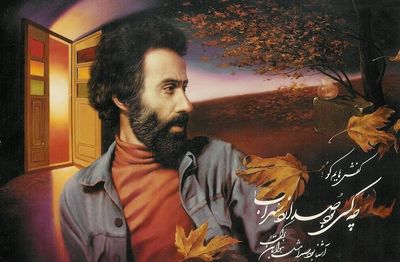“The screenplay of the project has been written based on a memory narrated by Sepehri’s family,” said Fatemi who is Sepehri’s nephew.
“The story of the film is focused on Sepehri’s childhood until when he decides to leave his hometown of Kashan, starting his journeys around the world to pursue his higher education,” he stated and added that the story of the film actually intends to show how Sepehri acquired his reputation as a poet and artist.
Fatemi, whose movie “Nokhodi” was selected as best film and won the special jury prize at the 24th Hamedan International Film Festival for Children and Young Adults in 2010, said that it’s difficult at present to attract an investor into such a project, which its target groups are children and young adults.
“This period of Sepehri’s life is really exciting and funny and we should not deem the movie as a mystic, because it will portray the normal life of the poet,” he said.
“Before her death, my mother published five books to amend mystical misinformation about Sohrab and made her best endeavors to tell the true-life story of the poet, which has been reflected in the screenplay of ‘Bird’,” noted Fatemi.
Earlier in 2018, filmmaker Ali Qavitan announced his new film “Sohrab’s Dream” that traces the mysticism and philosophy of Sepehri’s poetry.
Due to his striking resemblance to Sepehri, Qavitan himself played the role of the poet and painter who was one of Iran’s most influential literary figures over the past five decades.
The film, which has not premiered yet was shot on location in Kashan.
Born in 1928, Sepehri is second only to poet Nima Yushij, who is known for his pure style of blank verse.
As a talented artist and a gifted poet, Sepehri came to prominence with the publication of his collection “The Water’s Footfall” in 1965.
His works have been translated into the English, French, Italian and Spanish languages.
His paintings have been the most expensive works sold at the Tehran Auction over the past few years.
Sepehri died of leukemia in Tehran in 1980. His grave is located in the courtyard of the mausoleum of Imamzadeh Sultan Ali ibn Muhammad Baqir (AS) in the village of Mashhad-e Aradahal near Kashan.
Source:Tehran Times

